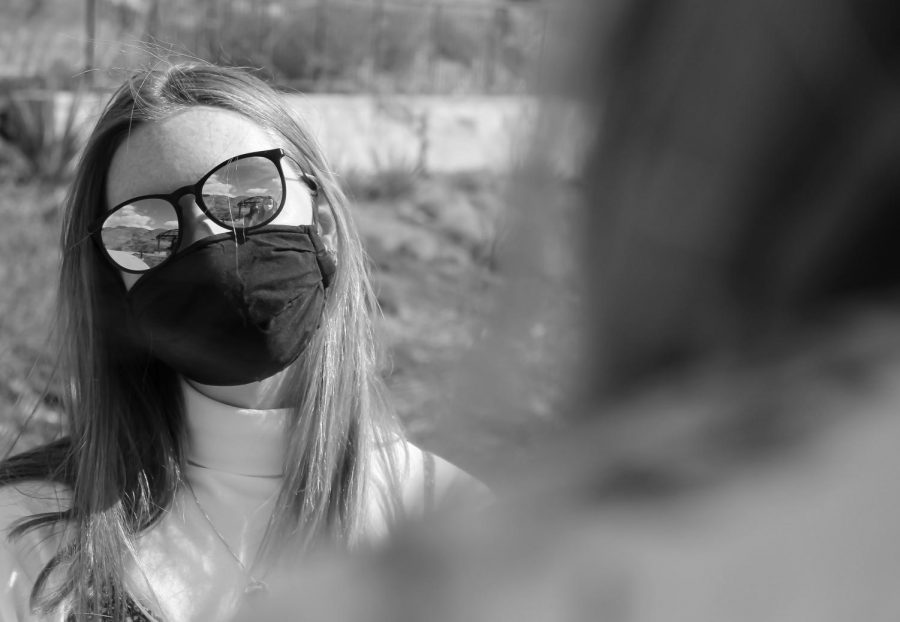Vaccinating the U Community: Protecting Against the Delta Variant of COVID-19
Interacting face-to-face with masks on. (Photo by Hailey Danielson | The Daily Utah Chronicle)
August 19, 2021
Fall 2021 at the University of Utah is going to look different from last year. The U is hoping to provide students with a fully in-person experience if they would prefer that to an online format.
This change comes after confidence in the rising vaccination rates and lowering COVID-19 infection rates. However, one potential obstacle stands in the way of a typical return to campus: the Delta variant.
The Delta variant was first identified in India in December and is now the dominant strain in the United States. The highest spread of cases is happening in areas with low vaccination rates.
According to a livestream put on by members of U Health, the Delta variant has caused more hospitalizations and more severe disease than the COVID-19 virus.
“The vast majority of COVID-19 patients in Utah who are hospitalized — over 90% — are unvaccinated,” said Michael Good, the CEO of U Health, in an email sent to the student body of the U on Wednesday, July 28.
According to the U Health team, the most effective measure to protect the people living in the state of Utah and the U.S. is getting vaccinated.
“You’re four times less likely to be infected if you’ve been vaccinated,” said Jeanmarie Mayer, a U hospital epidemiologist. “The vaccination provides broader immunization than natural infection and longer protection. It is recommended that those who have had COVID still get vaccinated.”
Mayer also said there has been an increase in daily patients with COVID-19 at the hospital.
“Utah had cases that were plateaued, but in the last few weeks the cases have doubled,” Mayer said. “We had been at five or six patients with COVID. The last few weeks we’ve started to max out with 30 to 40 patients daily in the hospital with COVID.”
During the livestream, some questions came in about people sending their children to school, specifically those either coming to the U for the first time or coming back to the U for the first time since they went home in Spring 2020. Some unvaccinated individuals were wondering if it was even worth it to start their vaccination process before heading to school.
“A single dose of the vaccine does not protect against the Delta variant so starting on the vaccinations as soon as possible is for the best,” said Andrew Pavia, chief of the division of pediatric infectious diseases.
Mayer said the COVID-19 vaccine has been shown to fight all variants and is highly effective against the Delta variant.
The panel said even though one dose does not protect someone entirely from the Delta variant, one dose is still better than none.
According to Good, as of July 28, 64% of Utahns 12 years of age and older have received at least one dose of a COVID-19 vaccine.
“By taking the vaccine, you’re not just protecting yourself, you’re protecting others, your family, your loved ones,” Mayer said.
There were a few voices speaking out about concerns about the true efficacy of the vaccine or questioning the validity of the science of the vaccine.
“MRNAs are not new, the process which gave us the vaccines,” said Kathy Wilets, the director of communications at U Health. “COVID is new, but not the process which gave us the vaccines for it.”
All on the panel agreed with Wilets and again reminded viewers to get vaccinated.
The U also put up an Instagram post on Aug. 4 explaining when one should wear a mask. It also highlights their “Anti-COVID Action Plan” which includes getting vaccinated, getting tested weekly if unvaccinated and wearing a mask indoors.
The latest CDC guidelines say fully vaccinated individuals should wear masks when indoors in high transmission areas to protect themselves from the Delta variant and potentially prevent the spread to others.
The U is unable to require vaccinations of its students due to H.B. 308 which prohibits any governmental entity in the state of Utah from requiring the COVID-19 vaccine.
“If you’re immunocompromised and worried, make sure you’re masked, practice physical distancing and ask those around you to get vaccinated,” Mayer said.








